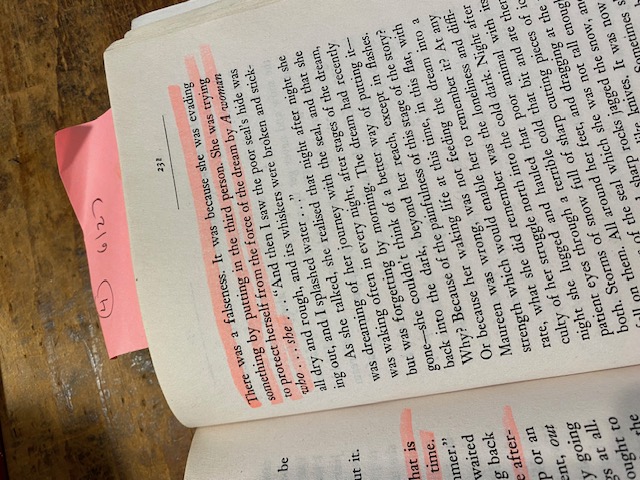You, Me, and Doris Lessing’s The Summer Before the Dark: The end
(pages 206 to 273)

Well, we’ve reached the end. For those who read along, thanks for joining me. One more time into the breach and then onward:
In which it all comes down to the seal. And hair?
Okay, so we’re picking back up with Kate in Maureen’s flat. Or rather, at first we’re back with Mrs. Brown, who’s fit herself back into the societally acceptable mold and is once again being treated with warmth and deference by shopkeepers and waiters. One wonders how long she’ll persist in what feels on the one hand to be her full recovery from her illness and on the other hand a sort of backsliding into the role she didn’t want for herself anymore, the role that stifled her true self. With a little less than seventy pages to go, clearly we aren’t seeing her in her final stage of development.
And sure enough, the very next day she’s forced to confront herself in another woman in her same position. Lessing even says, “Kate was following herself slowly.” Kate sees herself—or believes she is seeing herself—through others’ eyes as she witnesses, and judges, this other middle-aged woman. When she gets back to the flat, she sheds Mrs. Brown, in a sort of experiment.
There’s a remarkable moment on page 227, when Maureen insists that she isn’t going to be like her own mother, or like Kate, and Kate says, “And so you won’t be. The best of luck to you. And what are you going to be instead?” That’s the question, isn’t it, that Maureen is trying in answer in who to marry or whether to marry at all, but it’s also the question that we see Kate wrestling with throughout. Who is she if she isn’t the mother, the wife, the caretaker? What is her true identity within or apart from that?
On p 231 finally we get an explanation for those moments of “a woman.” It has indeed been an evasion, a distancing on Kate’s part. When recounting her seal dreams to Maureen, she begins with “A woman,” and then stops herself because “[t]here was a falseness. It was because she was evading something by putting it in the third person. She was trying to protect herself from the force of the dream by A woman who…”
Ultimately Kate does get the seal to the sea, and the seal joins countless other seals and swims off without a backward glance. And Kate returns to her family, having decided to not dye her hair again. Okay… Well… Hmmm. That’s her true self? That’s what she’s realized? That for the most part none of it matters, but her gray hair is a reflection of who she truly is? She thinks of her hair as a statement of intent, but at the end of the novel, I’m still not entirely clear on what that intent is. What am I missing here? I wanted to reread this book because I recalled loving it the first time around. The second time around, I still had a wonderful time with the prose, but am left feeling a bit unsatisfied with where we’ve landed.
What do you think?
Discover more from Cari Luna
Subscribe to get the latest posts sent to your email.

The Good Terrorist was actually the only book of hers that I didn’t finish. It felt like an attack on who Lessing herself had been, politically, when she was younger. Really turned me off. If you’re looking for more Lessing, The Golden Notebook really is wonderful, as are the Martha Quest books. I also very much liked Memoirs of a Survivor and Love, Again.
I wonder if it’s that last point. That none of it matters, that age comes for us all, that we simply make too much of a fuss. In the beginning, she does write that what happens to everyone, usually gradually, happened to Kate all at once, over the course of a single summer. So maybe it’s just that.
I do also feel that we land with a different book than we were promised at the outset, but maybe that is also me as a reader, and I picked up on something the first time around that I missed this time.
Yeah I wondered what was different this time, going back. We learn that her daughter has been running the household in her absence, but is that an improvement or just shuffling the caretaking off onto the next woman in line?
Yes, the seal definitely had the most satisfying ending! You raise an interesting point about divorce and the context at the time, but given Lessing’s own history of divorce, I would be surprised if that was a part of her logic here. And I agree that given the importance of Tim’s outburt in Kate’s own transformation, it felt like her relationship with him could have played a larger role in the ending.
Thanks for taking part, and for your thoughtful comments!
Thanks so much for taking part! It’s been fun to talk about it with you. I’ll totally join in on a readalong in your newsletter. Hopefully you’ll have better luck with it than I did, or run it better, or have an audience more open to it or something. I was met was quite a few unsubscribes as the weeks went on. Some even people I know in real life…
I wouldn’t mind a bit of that Global Food money either…